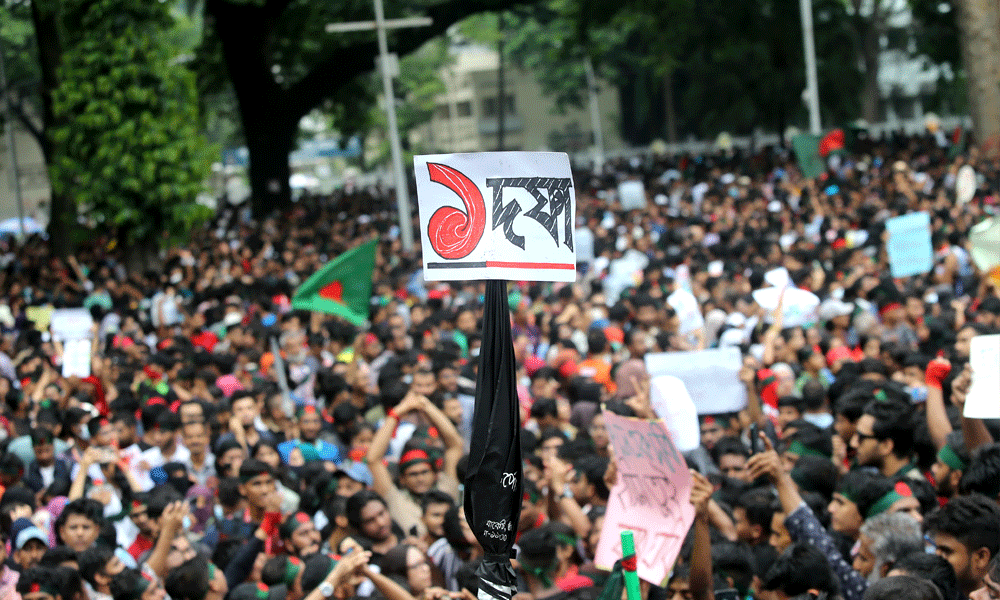Commentry
Missteps lead to misfortune: What’s next?
The government’s dealing with the situation has been widely criticised for exacerbating rather than mitigating the unrest.
Published: 04 Aug 2024

Photo : Daily Sun
The country’s streets have turned into battlefields as a peaceful student protest against government job quotas has morphed into a nationwide conflagration as a result of what many view as a mishandling of the matter by the authorities concerned, exposing deep-rooted discontent and a government struggling to maintain control.
The government’s dealing with the situation has been widely criticised for exacerbating rather than mitigating the unrest. A series of missteps have fuelled public anger and broadened the movement’s base beyond students. The imposition of a blanket internet blackout has crippled communication, hindered fact-checking and fuelled rumours. The mass arrest of students, including coordinators of the ongoing student protests, has galvanised public opinion against the government.
The violence that has erupted across the country is unprecedented in recent memory. Over 200 people, including students, bystanders, and law enforcement personnel, have lost their lives. Hospitals are overwhelmed with the injured, and the psychological trauma inflicted on the population is immeasurable. The images of young protesters, their faces etched with fear and determination, have become iconic symbols of a generation in revolt.
UNICEF has expressed grave concern over the impact of the violence on children, with at least 32 confirmed child fatalities. “This is a terrible loss,” said Sanjay Wijesekera, UNICEF South Asia Regional Director. “Children must be protected at all times.” The international community has also condemned the violence and called for restraint.
The protests have transcended the confines of student activism, resonating with a broader spectrum of society. Teachers, doctors, lawyers, cultural activists and civil society members have joined the movement, lending their voices to the growing chorus of dissent. Retired military officers, a traditionally conservative group, have also expressed solidarity with the protesters, a significant development that underscores the depth of public anger.
The government’s decision to impose an internet blackout has been widely criticised as a desperate attempt to suppress dissent and control the narrative. While the government claims it is necessary to maintain law and order, critics argue that it has stifled free speech, hampered rescue efforts, and disrupted essential services.
“The internet blackout is a blatant violation of our rights,” a young protester told the media. “They want to silence us, but we will not be silenced.”
The protests have also exposed deep-seated economic and social grievances. Rising unemployment, inequality, and corruption have eroded public trust in the government. The students’ demands for accountability and transparency have resonated with a population that feels marginalised and disenfranchised.
“We are not just fighting for quotas,” said another protester. “We are fighting for a better future for our country. We want a government that is accountable to the people.”
The government’s response to the protests has been met with widespread condemnation. The use of live ammunition against unarmed protesters has been described as a disproportionate and brutal use of force. The mass arrests of students and activists have been seen as an attempt to intimidate the opposition and stifle dissent.
“The government is using violence to crush our voices,” said a student leader. “But we will not be intimidated. We will continue to fight for our rights until we achieve our goals.”
As the protests continue, the pressure on the government is mounting. The international community is watching closely, and the economic consequences of the unrest are becoming increasingly apparent. The ball is now in the government’s court – it can choose to continue its repressive tactics and risk further instability, or it can engage in meaningful dialogue with the protesters and embark on a path of reform.
In a potential turning point, Prime Minister Sheikh Hasina on Saturday invited the quota reform protesters for a dialogue can be viewed as a positive development. “The doors of Ganobhaban are open. I want to sit with the quota reform protesters,” she said, adding, “I want to listen to them. I don’t want conflict.”
Coordinators of the Anti-Discrimination Student Movement, however, have said they have no plan to sit with the government.
The have announced a one-point demand seeking resignation of Prime Minister Sheikh Hasina and her cabinet members, terming it as the “demand of students.”
Nahid Islam, Sargis Alam and other key coordinators of the quota reform movement, made the announcement from a massive rally at the Central Shaheed Minar in Dhaka. They also gave a 24-hour ultimatum to reopen all university halls for students.
They have also called an indefinite “total non-cooperation” movement starting today in protest against the attacks and killings of students and the public throughout Bangladesh, and to press home their demand.
Meanwhile, the ruling Awami League announced on Saturday that party leaders and activists will gather across all wards in major cities and districts today, signalling a confrontational situation.
While announcing the programme during a press briefing at the party president’s office in Dhaka’s Dhanmondi area, AL General Secretary Obaidul Quader emphasised the importance of unity, calling for collective efforts from all who support the country’s independence, sovereignty, democracy, and progress to resist those hindering the nation’s development and achievements.
The current crisis is a defining moment for Bangladesh. The future of the country depends on the choices made by the government in the coming days and weeks.

